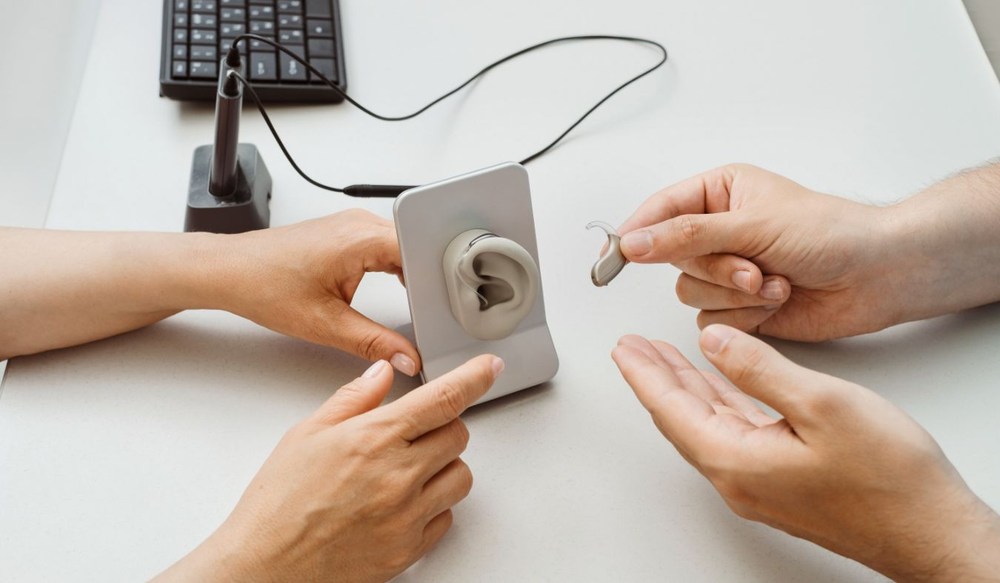From Communities To Classrooms: Hearing Care for All Children
The Audiology Offices today joins the World Health Organization and its

By: admin | December 23, 2024
When you take medication, you probably check the common side effects – upset stomach, drowsiness or headaches. But some medications can affect your hearing, a side effect that’s often overlooked in the fine print. This effect, called ototoxicity, can impact both your hearing and your balance.
Many important medications, from antibiotics to cancer treatments, can potentially affect your hearing. This doesn’t mean you should stop taking prescribed medications – often, these drugs are essential for treating serious conditions. But understanding their possible effects on your hearing helps you make informed decisions with your healthcare providers.
Your hearing connects you to conversations, music and important sounds in your environment. While some medications are necessary for your health, knowing their potential impact on your hearing allows you to work with your doctors to monitor any changes and explore alternatives when possible.
Balancing your medical needs with protecting your hearing is important. By understanding which medications might affect your hearing, you can have better conversations with your healthcare team about managing your overall health.
The auditory system is the part of our body responsible for hearing, allowing us to detect and process sound. It starts with the outer ear, which includes the visible part of the ear (pinna) and the ear canal. Sound waves travel through the ear canal and hit the eardrum, causing it to vibrate. These vibrations are then passed to the middle ear, where three tiny bones – the malleus, incus and stapes – amplify the sound. This mechanical energy is crucial for transferring sound from the air into the fluid-filled inner ear.
Inside the inner ear is the cochlea, a spiral-shaped organ filled with fluid and lined with tiny hair cells. When the amplified vibrations reach the cochlea, they create waves in the fluid, which bend the hair cells. Each hair cell is tuned to respond to specific frequencies of sound, converting the mechanical energy into electrical signals. These signals are then sent to the auditory nerve, which acts like a messenger, carrying the information to the brain. The hair cells are critical for hearing, and damage to them can lead to hearing loss.
Once the auditory nerve delivers the signals to the brain, the auditory cortex interprets them as meaningful sounds. This part of the brain processes details like pitch, volume and direction, allowing us to recognize voices, music and everyday noises. The auditory system works as a highly coordinated network, transforming sound waves into signals our brain can understand. Without this process, the sounds of the world would remain just vibrations, lacking meaning and connection.
Ototoxic medicines are drugs that can damage the inner ear, leading to hearing loss, tinnitus (ringing in the ears) or balance problems. These medications can harm the delicate structures within the cochlea, particularly the hair cells responsible for detecting sound vibrations and converting them into electrical signals for the brain. Since hair cells do not regenerate, any damage caused by ototoxic medications can be permanent. Some drugs also interfere with the auditory nerve, further disrupting the communication between the ear and the brain. Ototoxicity can occur when medications are taken in high doses, over extended periods or even sometimes at standard therapeutic levels, depending on individual susceptibility.
Several common medications are known to be ototoxic. Antibiotics like gentamicin and other aminoglycosides are among the most well-documented culprits, often used to treat severe bacterial infections. Certain chemotherapy drugs, like cisplatin, can also harm the auditory system, especially in cancer patients receiving aggressive treatments. Other medications, including high-dose aspirin, diuretics like furosemide and some anti-malarial drugs, can cause temporary or permanent hearing damage. Symptoms may develop gradually or suddenly, and patients might notice hearing loss, ringing in the ears or dizziness as early indicators of a problem.
The effects of ototoxic medicines can be severe, particularly if not detected early. Healthcare providers often monitor hearing closely when prescribing potentially ototoxic medications, especially in high-risk patients. Regular hearing tests may help catch changes early, allowing for adjustments to dosage or alternative treatments. If you suspect that your hearing is being affected by medication, it is important to speak with your doctor or audiologist immediately. By identifying ototoxicity early and addressing it promptly, you can help protect your hearing and reduce further harm.
Certain prescription medications, while effective for treating various medical conditions, can harm your hearing as a side effect. These medications are known as ototoxic drugs, and their use can lead to temporary or permanent hearing changes, tinnitus or balance issues. Understanding which prescriptions pose risks to your auditory system can help you make informed decisions with your healthcare provider.
Antibiotics like aminoglycosides, including gentamicin and streptomycin, are well-known for their ototoxic potential. These drugs are typically used to treat serious infections but can damage the hair cells in the inner ear, leading to hearing loss or balance problems. While their use is generally reserved for life-threatening conditions, doctors closely monitor patients on these antibiotics for any signs of hearing changes. Chemotherapy drugs, particularly cisplatin and carboplatin, are another group of medications associated with significant ototoxicity. These medications are crucial for treating certain cancers, but they may harm the delicate structures of the inner ear, leading to permanent hearing loss in some cases.
Loop diuretics like furosemide (Lasix) and bumetanide, used to manage fluid retention in conditions like heart failure or kidney disease, can also affect hearing. These drugs can disrupt fluid balance in the inner ear, resulting in temporary or, in rare cases, permanent hearing loss. Additionally, some anti-inflammatory drugs and antivirals, like high doses of hydroxychloroquine, may contribute to auditory side effects in certain individuals. If you’re prescribed any of these medications, it’s essential to discuss the risks with your healthcare provider, especially if you already have hearing concerns. Monitoring your hearing during treatment and reporting any changes early can minimize long-term damage.
While many people think of ototoxic medications as being prescription-only, several over-the-counter (OTC) drugs can also have harmful effects on your hearing. These medications are widely available and commonly used for pain relief, cold symptoms or minor ailments, making it important to be aware of their potential risks. Ototoxic effects from OTC drugs often arise when they are taken in high doses or for extended periods, though sensitivity varies from person to person.
One of the most common OTC medications associated with ototoxicity is aspirin, particularly when taken in high doses (usually more than eight to 12 pills daily) for extended periods. High doses of aspirin have been linked to temporary hearing loss and tinnitus (ringing in the ears), although these effects typically resolve once the medication is discontinued. Nonsteroidal anti-inflammatory drugs (NSAIDs) like ibuprofen (Advil, Motrin) and naproxen (Aleve) have also been implicated in hearing issues. These drugs can reduce blood flow to the cochlea, the hearing organ in the inner ear, potentially leading to hearing changes or ringing in the ears.
Decongestants, like pseudoephedrine and phenylephrine, which are commonly found in cold and allergy medications, may also pose a risk. These drugs can sometimes reduce blood flow to the inner ear or contribute to fluid imbalances, leading to dizziness, tinnitus or mild hearing issues. While the risk is generally low, it increases with excessive or prolonged use. If you use any OTC medications regularly and notice changes in your hearing, like ringing, muffled sounds or dizziness, consult a healthcare provider to assess whether your medication could be a contributing factor. Always use OTC medications as directed and consider discussing alternatives with your doctor if you’re concerned about their impact on your hearing.
Recognizing the symptoms of drug-induced hearing loss is crucial for catching changes early and preventing further damage. One of the most common signs is a sudden decrease in your ability to hear sounds clearly. You might notice that voices sound muffled, or you struggle to understand conversations, especially in noisy environments. High-pitched sounds, like birds chirping or phone rings, may also become harder to detect. These subtle changes can happen gradually or appear suddenly, depending on the medication and dosage.
Tinnitus is another frequent symptom of drug-induced hearing loss. It can present as buzzing, hissing or whooshing sounds that persist even when there’s no external noise. For some, tinnitus is constant, while for others, it may come and go. This symptom can be particularly frustrating and may impact concentration, sleep and overall well-being. If you’re experiencing tinnitus after starting a new medication, it’s important to bring this to your doctor’s attention.
Balance issues can also signal drug-related harm to your auditory system, as the inner ear plays a key role in keeping you steady. You may feel dizzy, unsteady on your feet or experience vertigo – a spinning sensation that can make it hard to move around safely. If you notice any of these symptoms while taking ototoxic medications, don’t ignore them.
If you suspect that your medication is affecting your hearing, it’s vital to take action quickly. Don’t stop taking your medication without consulting with your healthcare provider or an audiologist. They can provide guidance and potentially adjust your treatment plan if necessary. Keeping track of any changes in your hearing abilities and reporting them to your healthcare team immediately can help ensure that any impact on your hearing is addressed as soon as possible.
One simple but effective tip to protect your hearing is to stay informed about the medications you’re taking and their potential side effects. If any of them are known to be ototoxic, discuss this with your healthcare provider or audiologist. If you notice any changes in your hearing while taking medication, don’t hesitate to bring it up. Early detection and intervention can help manage these changes effectively and protect your hearing health.
Taking care of your health while also protecting your hearing can feel like a balancing act. However, it’s not only possible but entirely within your grasp with the right knowledge and approach. The first step is staying informed about ototoxic medications and their potential impact on your hearing. This understanding allows you to make informed decisions about your healthcare options.
If you notice any changes in your hearing while taking medication, it’s important to bring this up right away. Early intervention can make a significant difference in managing these changes and preserving your hearing health.
Remember, taking care of your overall health doesn’t mean sacrificing the well-being of your ears. With careful management and vigilance, you can continue treating other health conditions without compromising on maintaining good hearing health.
Understanding ototoxicity is an important part of managing your wellness and preserving your hearing abilities. If you’ve noticed any changes in your hearing while taking medication or if you’re curious about learning more about ototoxicity, we encourage you to get in touch. The Audiology Offices are here to provide expert guidance and support. You can contact us at our Gloucester, VA location at (804) 791-5011. Taking action today can help protect and preserve your hearing for tomorrow. It’s a significant step towards maintaining a balanced life.

The Audiology Offices today joins the World Health Organization and its
By: admin | February 25, 2026

Many people notice that their own voice sounds different when they first
By: admin | January 19, 2026

As 5G wireless networks expand and become more widespread, you might
By: admin | November 18, 2025
